Govt approves Rs60,939-cr subsidy for P&K fertilisers
Farmers will continue to get the DAP at Rs1,350 per bag for Kharif Season
image for illustrative purpose

New Delhi: The government on Wednesday approved a subsidy of Rs 60,939.23 crore for phosphatic and potassic fertilisers, including DAP, for the first six months of this fiscal as part of efforts to provide soil nutrients to farmers at an affordable price. The Union Cabinet, chaired by Prime Minister Narendra Modi, approved the proposal for Nutrient Based Subsidy (NBS) rates for Phosphatic and Potassic (P&K) fertilisers for Kharif Season, which is from April 1 to September 30, according to an official statement.
"Subsidy approved by the Cabinet for the NBS Kharif-2022 will be Rs 60,939.23 crore, including support for indigenous fertiliser (SSP) through freight subsidy and additional support for indigenous manufacturing and imports of DAP," it added. The increase in the international prices of Di-Ammonium Phosphate (DAP) and its raw materials have been primarily absorbed by the Union government. "The Union government has decided to provide subsidy of Rs 2,501 per bag on DAP instead of existing subsidy of Rs 1,650 per bag which is a 50 per cent increase over the last year's subsidy rates," the statement said.
At a media briefing, Information and Broadcasting Minister Anurag Thakur said the Cabinet has approved a subsidy of Rs 60,939 crore for P&K fertilisers for the first six months of 2022-23 as against the subsidy of around Rs 57,150 crore for these nutrients for the entire last fiscal. He said the subsidy on DAP has been increased to Rs 2,501 per bag and the farmers will continue to get the DAP at Rs 1,350 per bag. The total cost of a DAP bag is Rs 3,851. The subsidy on DAP has been increased five times to Rs 2,501 per bag from Rs 512 per bag in 2020-21, he added. The minister highlighted that even as the prices of fertilisers have increased sharply in the global markets, the government has ensured that the burden has not increased for the farmers. "There will be no burden on the farmers".
"As far as the farmers are concerned, from time to time we have been giving benefits. There is a sharp increase in raw material cost, shipping cost and other components which has led to the overall price increase as far as P&K fertilisers are concerned," he said. According to the statement, the increase in the prices of DAP and its raw material is about 80 per cent. "It (giving higher subsidy) will help farmers to receive notified P&K fertilisers on subsidised, affordable and reasonable rates and support the agriculture sector," it added.
The government is making available fertilisers, namely urea and 25 grades of P&K fertilisers to farmers at subsidised prices through fertiliser manufacturers/importers. "In view of the steep increase in the international prices of fertilisers and inputs i.e. urea, DAP, MOP and sulphur, the government has decided to absorb the increased prices by increasing subsidy on P&K fertilisers, including DAP. "The subsidy would be released to fertiliser companies as per approved rates so that they can make available fertilisers to farmers at an affordable price than it would have been otherwise," the statement said.
Under the NBS, which is being implemented since April 2010, a fixed rate of subsidy (in Rs per kg basis) is announced for nutrients namely Nitrogen (N), Phosphate (P), Potash (K) and Sulphur (S) by the government on an annual basis. The subsidy rates per kg for the nutrients N, P, K, and S are converted into per tonne subsidy on the various P&K fertilisers covered under the NBS. In the case of urea, the Centre fixes the maximum retail prices and reimburses the difference between the maximum retail price and production cost in the form of subsidy.

